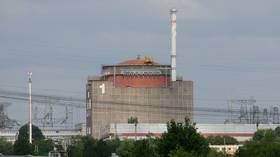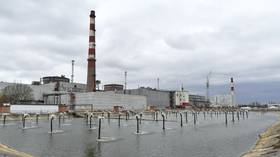Kremlin warns of ‘high threat’ of nuclear sabotage by Ukraine

A possible Ukrainian attempt to sabotage Europe's largest nuclear power plant in Russia’s Zaporozhye Region could lead to “catastrophic” results, Kremlin spokesman Dmitry Peskov has claimed.
The situation around Europe’s largest nuclear power plant, which has been under Russian control since March 2022, remains “tense,” Peskov told journalists on Wednesday.
“Really, there’s a high threat of sabotage by the Kiev regime; sabotage that might lead to catastrophic results,” Peskov warned.
According to the spokesman, an attack on the facility cannot be ruled out because the Ukrainian leadership “has many times shown its readiness to stop at nothing” to achieve its goals.
Peskov said one example was the collapse of the Russian-controlled Kakhovka dam in early June, which Moscow has blamed on Kiev. The incident had “horrific consequences,” the Kremlin spokesman noted. The destruction of the dam led to flooding on both banks of the Dnieper River and caused multiple deaths. Ukraine has claimed that the incident was caused by Russia.
“All measures are being implemented to resist the threat [to the Zaporozhye nuclear plant],” Peskov added.
Renat Karchaa, a senior official at Russian nuclear power plant operator Rosenergoatom, warned on Tuesday that Kiev was planning to strike the Zaporozhye facility with long-range high-precision munitions and kamikaze drones.
Intelligence obtained by Rosenergoatom suggests that Kiev could also attempt to target the plant with a Soviet-made Tochka-U tactical ballistic missile loaded with radioactive waste, Karchaa claimed.
Moscow and Kiev have repeatedly accused each other of shelling the Zaporozhye plant throughout their conflict. The Russian Defense Ministry also claimed to have repelled several attempts to retake the station by Ukrainian assault units, which reportedly approached the facility on boats via the now-drained Kakhovka reservoir.
The Zaporozhye Nuclear Power Plant has returned to the spotlight in recent weeks after senior officials in Kiev claimed that Russia was preparing a nuclear incident at the facility. Ukrainian President Vladimir Zelensky alleged that Moscow wanted to cause a “radiation leak” at the plant, while presidential aide Mikhail Podoliak accused the Russian military of mining the plant’s cooling pond.
Peskov previously rejected those claims as “yet another lie.” The head of the International Atomic Energy Agency (IAEA), Rafael Mariano Grossi, recently visited the facility and said that “no mines were observed at the site” during his inspection.














